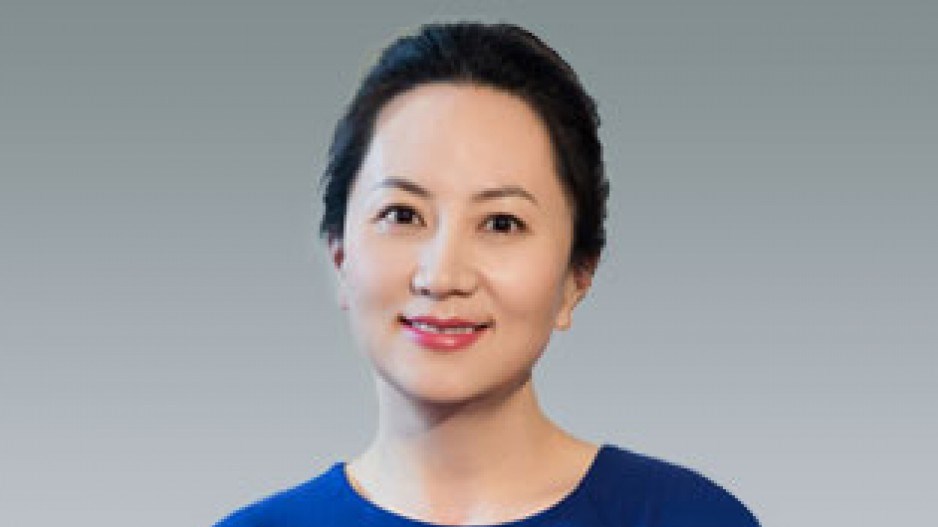The CFO of Chinese mobile tech giant Huawei Technologies Co. Ltd., who is also the daughter of the company’s founder and a leading voice in China’s new economic model, was arrested at Vancouver International Airport (YVR) earlier this month and faces extradition to the United States as of December 6.
According to a Department of Justice Canada statement obtained by the Richmond News, Meng Wanzhou was arrested December 1 while catching connecting flights through YVR. The executive is accused to have sold products to Iran through a subsidiary company in contravention to U.S. sanctions imposed 2009-2014.
According to the Richmond News, Weng’s lawyers and Canadian prosecutors spent six hours at a bail hearing at B.C. Supreme Court arguing whether or not the Huawei executive is a flight risk.
Canadian prosecutor John Gibb-Carsley said in court that a warrant had been issued for Meng's arrest in New York Aug. 22., and that Meng should not be set free given her family’s wealth and resources. Gibb-Carsley alleged that Huawei had done business in Iran through a Hong Kong company called Skycom that is actually a branch of Huawei.
Meng’s lawyers said the executive faces shame and the risk of becoming a pariah if she returns to China. In addition, Meng has contended that Huawei sold Skycom in 2009. The hearing will resume Monday.
The incident comes at a critical time in the increasingly fractious Washington-Beijing relationship and injects Canada into the centre of the fray.
Kwantlen Polytechnic University business professor Zhang Guoren, who helped launch Chinese-Canadian think tank Grizzly Bear Institute of Canada in 2016, said Meng’s arrest could have serious consequences for future Chinese investment in Canada.
“People have to understand that, in China, Huawei is viewed not as just another conglomerate,” Zhang said. “It has attained the status of almost a national and cultural icon for the Chinese people, because they view Huawei’s technological achievements and growing global eminence as a point of nationalistic pride…. An arrest like this will undoubtedly elicit a strong and very emotional reaction.”
Huawei, based in Shenzhen, overtook Apple Inc. (Nasdaq:AAPL) as the world’s second-largest smartphone maker this year, trailing only South Korean conglomerate Samsung. The Chinese firm is also the world’s largest telecom equipment manufacturer.
Meng is important to Huawei beyond her executive position; she is the daughter of company founder Ren Zhengfei, one of China’s top business officials and a member of the ruling Communist Party of China.
China’s state-friendly media outlets have already condemned the arrest. An editorial by the Global Times said: “With the arrest, the U.S. is sending signals to the international community that it is targeting Huawei. It is clear that Washington is maliciously finding fault with Huawei and trying to put the company in jeopardy with U.S. laws.”
Zhang noted that Huawei has invested heavily in Canada in the last 10 years, even going as far as sponsoring the likes of the Canadian Broadcasting Corp.’s Hockey Night in Canada and the National Hockey League’s Ottawa Senators in an effort to strengthen relations between the company and Canadian citizens.
“In 2017, Huawei invested $140 million in Canada for R&D purposes,” Zhang said. “That puts them at No. 22 among all companies’ Canadian R&D spending during that year. They have 500-plus researchers working here…. It’s obvious they treat Canada as more than just another market, and I think we’ll see Chinese enterprises think twice about investing in Canada moving forward.”
U.S. officials, however, have long contended that Huawei (along with fellow Chinese mobile phone maker ZTE Corp.) poses a security risk not only to the United States, but also to western countries in general. Officials say Huawei’s systems could theoretically be used to spy on users and in recent years have alleged that Huawei has sold products containing technology derived from U.S. sources to countries like Iran.
As recently as October, U.S. officials warned Ottawa about the risks posed by Huawei. In a letter sent to Prime Minister Justin Trudeau, U.S. senators Marco Rubio and Mark Warner said Huawei networks and technologies are vulnerable to Chinese government interference.
Canada sees Huawei as a potential solution for the country’s future 5G mobile network, but the U.S. letter said such a network run by Huawei is risky since “there is ample evidence to suggest that no major Chinese company is independent of the Chinese government and Communist Party.”
Adding to tensions is the escalating tariff conflict between the United States and China, which had just begun to show signs of possible recovery with U.S. President Donald Trump and Chinese President Xi Jinping meeting at the G20 summit in Argentina earlier this month.
Former U.S. foreign trade officer Sean King said Beijing’s contention that the arrest “seriously harmed the human rights of the victim,” as the Chinese embassy in Ottawa claimed in a statement about Meng’s arrest, was a hollow talking point given China’s record on the abduction of Hong Kong booksellers critical of the regime, as well as the detention of several individuals with foreign citizenship in recent years.
“If enforcing our own laws is enough to kill the US/PRC [People’s Republic of China] trade talks that came out of the G-20, then those talks weren’t worth having to begin with,” King said, adding also that the incident likely won’t help Ottawa’s trade chances with Beijing - but may aid its future trade dealings with Washington.
“Hopefully, President Trump keeps moments like these in mind when weighing whether to keep in place his ridiculous steel tariffs against blood ally Ottawa on the insane pretense of national security,” King said.




